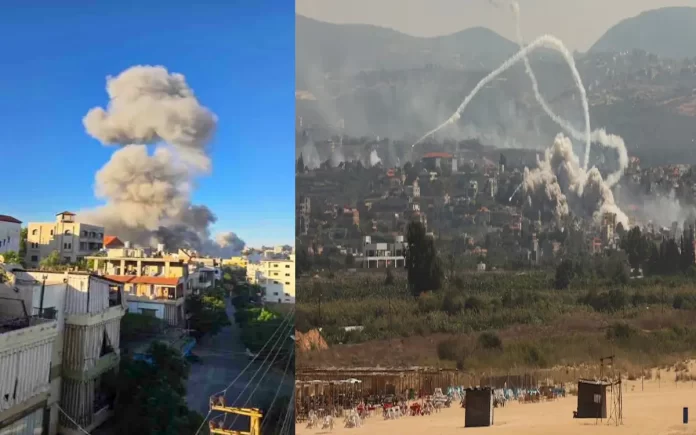Reports suggest that a 21-day ceasefire between Israel and Hezbollah is imminent, despite ongoing Israeli military strikes in Lebanon. Citing senior U.S. officials, Sky News reported on Thursday morning that the ceasefire could take effect within hours. This follows Israeli Prime Minister Benjamin Netanyahu’s statement during a late-night security consultation that “negotiations will only be under fire.” Netanyahu is en route to New York, where he is scheduled to address the United Nations on Friday, and his office has not yet commented on the ceasefire reports.
Also Read: Australia Advises 15,000 Citizens to Exit Lebanon Over Airport Closure Fears
While Hezbollah will not be a formal signatory to the ceasefire, U.S. officials believe that Lebanon’s government may coordinate the group’s acceptance of the agreement. The deal, which calls for a 21-day halt in hostilities, has received backing from a broad international coalition, including the U.S., France, Australia, Canada, the European Union, and several Middle Eastern nations. This initiative aims to facilitate a diplomatic solution and buy time for further negotiations, including talks involving Hamas in Gaza.
The proposed ceasefire has sparked intense reactions within Israel’s political sphere. Finance Minister Bezalel Smotrich strongly opposed the deal, calling for the complete destruction of Hezbollah to ensure the security of Israel’s northern residents. He warned that the ceasefire could allow Hezbollah to regroup and prepare for further conflict. Minister of Culture and Sports Miki Zohar echoed these concerns, expressing fears that the ceasefire might undermine Israel’s recent military achievements.
On the other hand, opposition leader Yair Lapid suggested that Israel should agree to the ceasefire but limit it to seven days to prevent Hezbollah from regaining its command and control capabilities.
Former Prime Minister Naftali Bennett also criticized international pressure for a ceasefire, asserting that Israel had only recently begun making significant progress in degrading Hezbollah’s capabilities. He insisted that Hezbollah should disarm and retreat from the Israeli border.
The ceasefire proposal, jointly advocated by U.S. President Joe Biden and French President Emmanuel Macron, calls for an immediate cessation of hostilities to allow civilians in the region to return to their homes. However, no official confirmation of the agreement has been made by either the Israeli or Lebanese governments as of Thursday afternoon. Meanwhile, the Israel Defense Forces (IDF) continued their operations in Lebanon, and no rocket sirens have been reported in northern Israel since Wednesday afternoon.
The coming hours will likely determine the future of this fragile ceasefire and its potential impact on the broader conflict.
Key Points:
- Imminent Ceasefire: A 21-day ceasefire between Israel and Hezbollah is expected to take effect soon, despite ongoing Israeli strikes in Lebanon. Hezbollah will not be a signatory, but Lebanon’s government may coordinate with the group.
- Netanyahu’s Stance: Israeli Prime Minister Benjamin Netanyahu stated that “negotiations will only be under fire.” He has not yet responded to reports of the ceasefire as he travels to New York for a UN address.
- International Support: The ceasefire is backed by a coalition of nations, including the U.S., France, Australia, Canada, the EU, and several Middle Eastern countries, who aim to secure a diplomatic solution and prevent further escalation.
- Political Reactions in Israel: Finance Minister Bezalel Smotrich and other Israeli officials oppose the ceasefire, arguing it could allow Hezbollah to regroup. Opposition leader Yair Lapid suggested a shorter, seven-day ceasefire to limit Hezbollah’s recovery.
- U.S.-French Proposal: The ceasefire proposal was jointly issued by U.S. President Joe Biden and French President Emmanuel Macron, calling for an immediate 21-day halt in fighting to enable civilians to return home.
- Continued Israeli Operations: Despite the ceasefire discussions, the IDF continues its military operations in Lebanon, with no recent rocket alerts in northern Israel.



